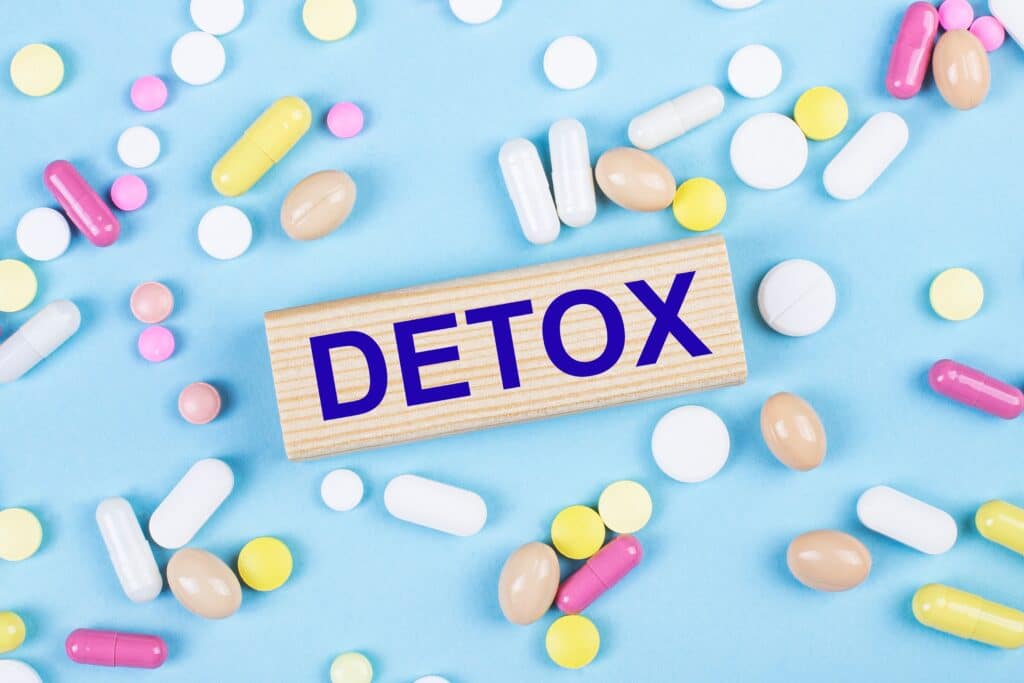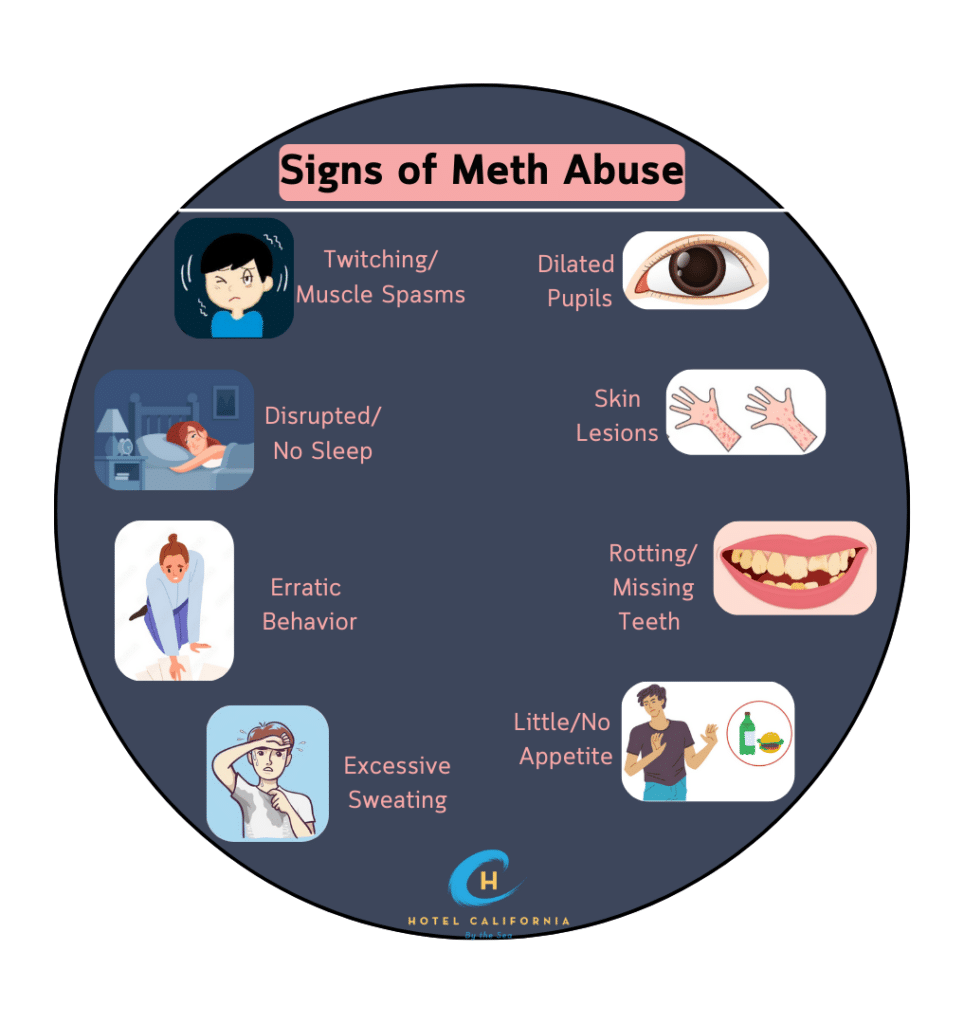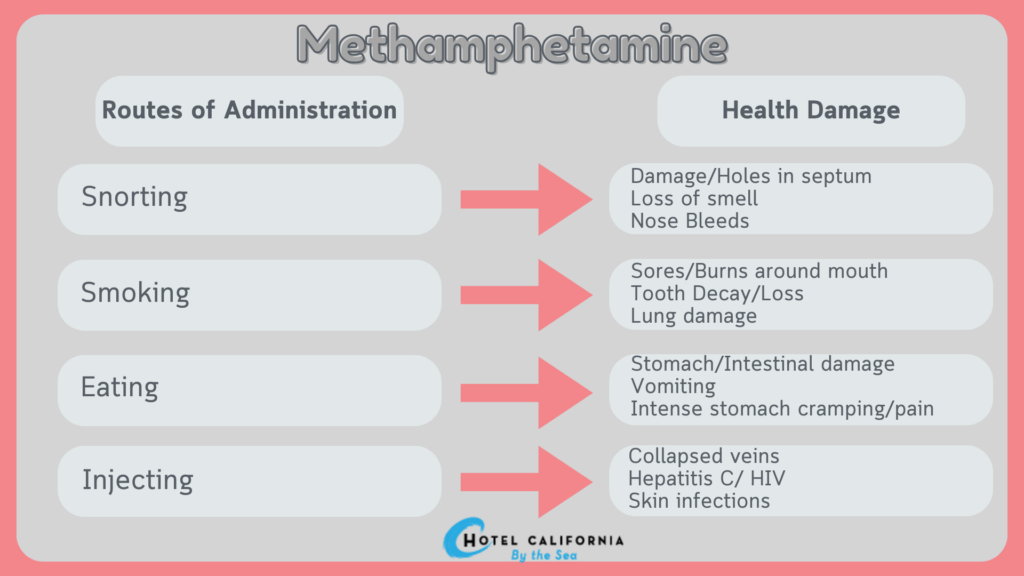How do you Detox from Meth?
Meth is a powerful stimulant substance that affects the central nervous system. Its potency often leads to rapid dependency and can lead to the development of abuse, methamphetamine use disorder and overdose. According to the National Institute on Drug Abuse, between 2015-2019, the number of overdose deaths associated with meth almost tripled. The Centers for Disease Control and Prevention says since the Covid-19 pandemic, meth use and meth overdose have contributed to the rise in numbers. Meth use is especially prevalent in the polydrug use with opioids such as fentanyl.

How does meth work? Meth works in the brain by artificially increasing the amount of natural chemicals, such as dopamine, in the brain. When meth enters into the blood system, it triggers the brain into releasing these chemicals to flood the brain. Dopamine is involved in many functions of the brain and body. It affects body movement and can impair and reduce coordination. It affects the ability to learn and can impact verbal learning, memory and the ability to solve cognitive problems. It affects emotion and motivation. It also plays an important role in the reinforcement of rewarding behaviors.
Because meth is a highly addictive substance, professional behavioral health treatment is necessary to recover from meth abuse. The first step in recovery from any addictive substance is detox. Detox is the process of physically eliminating toxins and other mind-altering substances from the body. Detoxing at home can be harmful due to the intense and uncomfortable withdrawal symptoms that can arise. Another factor for detoxing at a substance use disorder treatment center is that detoxing away from home can be more beneficial for some users. Removing the user from environments in which they use meth can help them avoid cravings and triggers associated with their drug use.
How to Detox from Meth
Medical detox is the first step in recovery from a substance use disorder. There are many factors and variables that affect the meth detox timeline and process. For moderate users of meth, the initial detox process can take on average about three days. However, for heavier users with more intense addictions, detox can last up to a week. The detox process is broken down into three stages: evaluation, stabilization and transition into further treatment.
In the evaluation stage, a team of physicians, clinicians and addiction specialists will give the patient a medical assessment. This allows a comprehensive treatment plan to be created to address the physical aspects of meth addiction as well as any presenting co-occurring mental health conditions that often appear.

During the stabilization stage, treatment will begin as soon as the necessary evaluations have been made and a treatment plan has been set. Oftentimes, this requires the use of medication-assisted treatments (MAT) to help alleviate the often uncomfortable, symptoms of withdrawing from an addictive substance such as meth. Though, there are no approved medications that can specifically treat meth use disorder, there are medications that can be taken to help treat the withdrawal symptoms that occur during the meth detox process. Medication such as fluoxetine can help treat the symptoms of depression, anxiety and insomnia. Aripiprazole is used to treat meth-induced psychosis. And Pexacerfont is often used to treat intense meth cravings. In some cases, benzos or muscle relaxants can be prescribed to help ease muscle tension or anxiety.
In the last stage of detox, patients focus on transitioning into further treatment. The physical detox process has been completed and patients are now ready to move to further aspects of treatment. This includes long-term medication management as well as intensive cognitive therapies.
What is the difference between Meth Detox and Meth Withdrawal?
Detox and withdrawal are commonly used terms when addressing aspects of substance addiction treatment. They are not synonymous with each other. They are two different aspects of treatment. Detox refers to the process of removing toxins and drugs from the body. It is when drugs and alcohol are completely eliminated from a person’s system. Withdrawal refers to the side effects and symptoms that can occur when drug usage has been abruptly stopped or drastically decreased. Withdrawal symptoms often appear during the detox process.
There are various types of detox. Inpatient detox consists of detoxing under the care of a medical facility where patients will receive 24-hour supervision. Outpatient detox allows patients to detox in the comforts of home. However, it is not always recommended due to the possible risks of complications and side effects that can occur when detoxing from a potent drug. Medical detox is a term that refers to the usage of FDA-approved medications to treat intense withdrawal symptoms patients experience during detox.

Detoxing helps patients remove toxins from the body while safely managing withdrawal symptoms that can occur during the process.
When a person has become tolerant, dependent or addicted to a substance, their bodies have adapted to the drugs and are unable to function normally without it. When usage has stopped or drastically decreased, the body can begin to experience symptoms of withdrawal as it tries to rebalance itself and re-adapt to a new environment. Meth withdrawal symptoms can be debilitating and cause cravings in order to alleviate the pain. Because of this, medical and professional help when experiencing withdrawal symptoms can help keep the patient safe.
Common symptoms of meth withdrawal include fatigue, increased appetite, agitation, insomnia, excessive sweating, paranoia, hallucinations, meth psychosis, meth cravings, fever, confusion, nausea, loss of motivation, suicidal thoughts, anxiety, depression and dehydration.
On average, withdrawal from meth lasts around 14 days. For those who experience severe addiction, withdrawal can last up to five weeks. Meth withdrawal is also dependent on factors such as age, psychological and physical characteristics, form of substance used, timeline to substance use and type of detox process. Withdrawal can occur without detox. This is because withdrawal can occur within hours after a patient has stopped taking meth.
Check Your Insurance Coverage for FREE
Find out if your insurance covers addiction treatment in minutes. We accept most insurance!
Meth Withdrawal Timeline
According to a 2010 study, withdrawal symptoms are the most intense about 24 hours after drug use has stopped. This includes extreme meth cravings and thoughts of suicide and depression. The psychological symptoms and sleep troubles can last for weeks. Depression can last for months after initial drug use has stopped.
- 24-48 hours. This stage of meth withdrawal is known as the “crash” phase. Or the acute phase of withdrawal. It is the most severe and intense stage. It occurs within the first day of stopped drug use where patients will experience a sharp decline in energy, cognitive functions, nausea, abdominal pain, suicidal thoughts, anxiety and depression.
- Days 3-10. During this time meth withdrawal symptoms will begin to peak as the body begins to readjust. Feelings of pain, agitation, intense cravings, mood swings and extreme fatigue will set in.
- Days 14-20. Most withdrawal symptoms will last around 2-3 weeks. Feelings of depression and anxiety may continue while feelings of improved sleep, increased appetite and mood stabilization will also take place.
- Over a month. During this stage of post-acute withdrawal, some psychological symptoms such as depression and anxiety can linger on for several more months depending on each patient.
The Future of Meth Addiction Treatment
There is currently no medication specifically approved to treat meth addiction. However, new clinical trials using monoclonal antibodies have been found to be beneficial in treating meth addiction. According to the National Institute on Drug Abuse, there have been advances in current research into monoclonal antibody-based medications that can provide reversal of the effects of meth.
These new studies show that monoclonal antibody therapy binds to meth in the bloodstream and circulates it away from the brain. That way the drug goes directly to the kidney and liver, which allows it to be excreted without producing euphoric, intoxication or withdrawal effects. The antibody can stay in the bloodstream for a long time with a half-life of about 19 days. Researchers believe this could be an effective form of long-term management for meth addiction treatment.
Reach out to Hotel California by the Sea
We specialize in treating addiction and other co-occurring disorders, such as PTSD. Our Admissions specialists are available to walk you through the best options for treating your addiction.
Methamphetamine Treatment
Currently, evidence-proven methods such as CBT, DBT and EMDR therapy are the only approved treatments for people diagnosed with meth use disorder. Meth cravings have proven to be extremely intense due to the potency of the drug and its addictive nature. At Hotel California by the Sea, our substance use disorder program specially tailored for clients addicted to meth can help them overcome their addiction and co-occurring mental health disorders. Clients will go through all levels of care including detox, residential and outpatient treatments.
FDA-approved medications to help treat withdrawal symptoms and the long-term treatment of cravings can also help provide stabilization in the patient as they move throughout the rehab process. We offer intensive individual, group and family therapies according to the treatment needs of each client. Meth is a powerful stimulant substance. With the assistance of Hotel California by the Sea, clients will have the tools and resources they need to overcome their addiction and live a healthier life in sobriety.
References:
https://www.addictioncenter.com/drugs/meth/withdrawal-detox/
https://nida.nih.gov/research-topics/methamphetamine
https://www.ncbi.nlm.nih.gov/pmc/articles/PMC4164186/
https://www.medicalnewstoday.com/articles/meth-withdrawal-symptoms#symptoms
https://www.healthgrades.com/right-care/substance-abuse-and-addiction/meth-withdrawal-symptoms
https://www.gatewayfoundation.org/addiction-blog/difference-between-detox-withdrawal/
https://treatmentmagazine.com/a-potential-breakthrough-in-meth-treatment/
https://addictionblog.org/infographics/meth-withdrawal-timeline/
